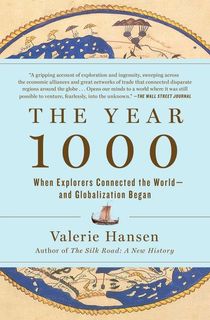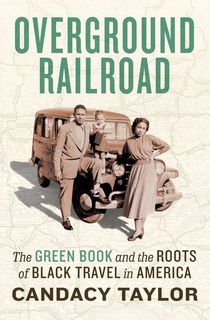As the year begins to wind down, we thought we’d take a look back at the best history books published in 2020. From those that were longlisted and shortlisted for awards, to those that rapidly became bestsellers, this list includes some of the most illuminating books that have hit shelves this year.
Spanning a range of topics, including how globalization got its start, the history of the Vikings, modern conflict in the Middle East, and more, these books shed light on unique chapters of history with new perspectives, compelling research, and riveting storytelling. The history books below are some of the year's best, so don't miss out!

The Year 1000
In The Year 1000, Yale University professor Valerie Hansen presents more than 30 years of research that points to an exchange of cultures occurring much earlier than commonly thought. Looking at the year 1000 C.E. as the beginning of globalization, Hansen draws evidence from all over the globe to argue that goods, ideas, and people were already moving between distant cultures.
From China’s demand for Middle Eastern goods, to the spread of Islam into Africa and Central Asia, to the Vikings' trips to the Americas, Hansen paints a vivid portrait of global exchanges. In her sweeping account, Hansen “displays a remarkable lightness of touch while stuffing the book full of fascinating details” (Publishers Weekly) to create an eye-opening and lively new account of an often overlooked period of history.

Unworthy Republic: The Dispossession of Native Americans and the Road to Indian Territory
Recognized as a finalist for the National Book Award and shortlisted for the Cundhill History Prize, Claudio Saunt's Unworthy Republic presents a profoundly moving and deeply insightful history of President Andrew Jackson’s Indian Removal Acts.
Related: These Native American History Books Shed New Light on the Past and Present
In this searing book, Saunt uses firsthand accounts and federal records to show how the deportation of more than 80,000 Native Americans was originally conceived, vigorously contested, and viciously orchestrated. Saunt details the motivations behind the Indian Removal Acts, including expanding slavery, and the heartbreaking fallout of its implementation, which continues to impact Native American communities in the United States today.

War: How Conflict Shaped Us
In her thought-provoking new book War: How Conflict Shaped Us, Margaret MacMillan zooms out to look broadly at the experience of war. Examining wars from ages past as well as those close at hand, MacMillan questions the relationship between humans and violent conflict. She dives into the history of war, questions its patterns, and leads readers through an illuminating investigation into a phenomenon we all struggle to comprehend.
Related: 10 War Books That Enlighten, Move, and Educate Their Readers

Caste: The Origins of Our Discontent
From Pulitzer Prize winner and bestselling author Isabel Wilkerson comes a riveting look at the caste system that has underpinned American history and continues to mold American life today. Seamlessly tying together a wealth of research, individual anecdotes, and a comparative look across societies, Wilkerson exposes the obscure American caste system and delves into its everyday manifestations and damaging effects.
Wilkerson’s artfully told story of human experience and history has been praised across the board, topping the New York Times Best Seller list, making the long list for the National Book Award, and having been chosen among the best books of the year by The New York Times Book Review, O: The Oprah Magazine, and Time magazine, just to name a few. If you enjoy reading Caste, you may also like Wilkerson's highly acclaimed The Warmth of Other Suns, which explains the history of the Great Migration.

Black Wave
Revealing the gravity of the Iranian Revolution and its impact on the decades that followed, Kim Ghattas delivers a compelling account of the Middle East’s recent history. She uses thorough research as well as local reporting to trace the events that led up to the revolution, explain how the revolution resulted in a bitter rivalry between Saudi Arabia and Iran, and detail how the shifting dynamics within the Middle East have caused consequences on a vast human level.
Weaving together a powerful story that spans Lebanon, Egypt, Pakistan, and beyond, Ghattas has written “a superbly researched and subtly told story” (The Wall Street Journal) that has been shortlisted for the Cundhill History Prize, became one of the year’s top history books on Amazon, and was selected as a New York Times Notable Book.

Children of Ash and Elm: A History of the Vikings
Capturing the full and rich nuances of the Viking Age, Neil Price's Children of Ash and Elm offers a sweeping account of the famous Scandinavian culture that stretched from North America to the Asian Steppes. Price explores the period between 750 and 1050 C.E., delving into the Vikings' changing culture and politics and explaining how the Vikings interacted with the other societies they encountered. With decades of experience in archeology, Price relies on archeological and textual evidence to move past stereotypes and reveal the Vikings as never before.
Related: A Single Viking's Berserker Rage Changed World History Forever

Overground Railroad
Published annually between 1936 and 1966, The Negro Motorist Green Book helped Black people safely travel through the United States during the Jim Crow era by listing hotels, restaurants, gas stations, and other businesses that wouldn't refuse to serve them on the basis of skin color.
Related: 19 Facts About Black History That You Might Not Know
In her celebrated book Overground Railroad, Candacy Taylor shares the history of the Green Book, from the stories of those who helped create it, to its lasting significance in a country still struggling with racism. Visiting nearly 5,000 of the businesses listed in the Green Book herself, Taylor combines interviews, newspaper stories, and archival records to provide a vivid historical account of the Green Book and place it within its wider historical context.

The Last Million: Europe's Displaced Persons from World War to Cold War
At the close of World War II, millions of Europeans were left behind in Germany, displaced from their homes. In his book The Last Million, David Nasaw tells the story of these displaced people—a story so often lost among the more striking battles, heart-wrenching atrocities, and unforgettable heroics of the Second World War.
Related: 10 Survival Stories That Reveal the Power of the Human Spirit
Struggling to address such a large group of displaced people with so many wide and varied backgrounds—including Jewish concentration camp survivors, political prisoners, Nazi collaborators, and Eastern European immigrants—the international community spent years trying to determine a suitable course of action. Nasaw chronicles what ultimately became of the million stateless people who had no home to return to after the war.

The Jakarta Method
Cloaked in secrecy, the CIA and its covert Cold War missions have remained an obscure part of history. Here, Vincent Bevins exposes how the U.S. helped the government of Indonesia dismantle the nation's communist party. Resulting in the deaths of nearly one million civilians, CIA action in Indonesia had costly effects within the country as well as extensive international implications, such as inspiring similar terror campaigns in Brazil and Chile. Revealing a hidden chapter of history, Bevins' riveting book incorporates declassified records, archival materials, and interviews from around the world to deliver "a shocking portrait that few readers will forget" (Kirkus Reviews).

Eat the Buddha: Life and Death in a Tibetan Town
Recounting decades marked by conflict, disagreement, and resistance, Barbara Demick reveals the modern history of Tibet and the complex experiences of its people in her highly praised book Eat The Buddha. Demick illustrates the depth of challenges Tibet faces in its relationship with China, sharing the vast and varied ways in which the clashes between the global superpower and the small, enduring nation affect the everyday realities of those living in both countries.

First Principles: What America's Founders Learned from the Greeks and Romans and How That Shaped Our Country
In his new book First Principles, Thomas E. Ricks explains how each of the Founding Fathers' philosophies on governance came together to shape the United States. From George Washington, who formed his political ideology by listening to the elites of the day, to John Adams, who relied on his understanding of Roman law, Ricks offers an enlightening and thoughtful history of revolutionary America in this volume that James Mattis, the 26th Secretary of Defense, called a "jewel of a book.”
Related: 9 Fascinating Books About the Founding Fathers of America

Ravenna: Capital of Empire, Crucible of Europe
Scholars often focus on cities like Rome and Constantinople when studying ancient history. However, as the fourth century drew to a close and the Roman Empire's grip began to falter, another city was thriving: Ravenna, a hub of architecture, culture, and political thought. King's College professor Judith Herrin pulls together archeological discoveries, careful research, and the life stories of the city's luminaries to share Ravenna's vibrant history and its importance within Christianity, the Mediterranean, and the West more broadly.
Related: 11 Roman History Books Beyond The Rise and Fall of the Roman Empire










